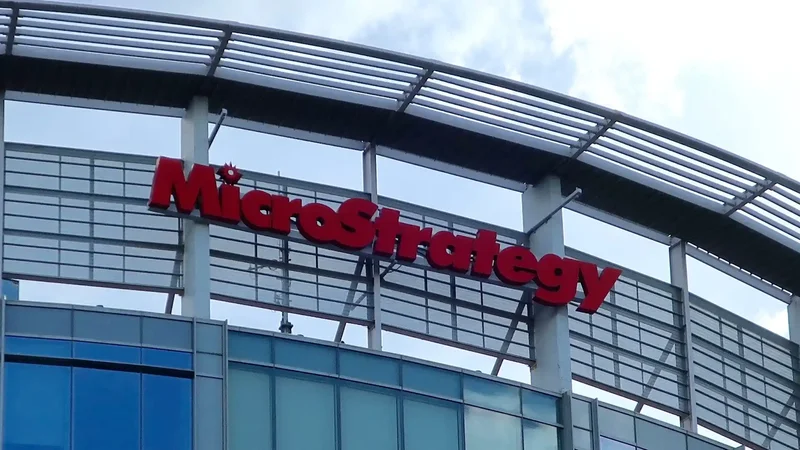MicroStrategy's Latest Stock Surge: What This "Tax Break" Actually Means
So, we’re just pretending MicroStrategy is a real company now?
I’m asking seriously. Because I just read that the U.S. Treasury and the IRS—you know, the people who will hunt you down for a hundred-dollar miscalculation on your 1099—just gave Michael Saylor’s Bitcoin hoard a multi-billion-dollar hall pass.
Let me get this straight. The company, which now hilariously calls itself just "Strategy," was staring down the barrel of the Corporate Alternative Minimum Tax. This is a 15% tax designed specifically to stop mega-corporations with over a billion in income from playing shell games to pay nothing. Strategy, with its mountain of over 640,000 bitcoins, had so much in "unrealized gains" that it was about to trip the wire. We’re talking a potential tax bill in the billions.
Then, like magic, the Treasury issues "interim guidance." The new rule? Companies can just... ignore unrealized crypto gains when calculating if they owe this tax.
Poof. The problem disappears. The stock (MSTR) jumps 6.5%. The retail bros on Stocktwits go wild. And I’m sitting here wondering if I’ve slipped into a parallel dimension where the rules are made up and the points don't matter.
One Business, One Asset, One Hell of a Gamble
A "Strategy" That Ain't a Strategy
Let's be real about what this company is. In February 2025, they formally rebranded from MicroStrategy to Strategy, proclaiming themselves “the world’s first and largest Bitcoin Treasury Company.” This is corporate-speak of the highest order. It's like a guy who spends all his money on lottery tickets rebranding himself as a "Probabilistic Asset Acquisition Specialist."
This isn't a strategy. It's a bet. A single, massive, leveraged bet.
The actual software business that started all this? It’s a ghost. A rounding error. In the second quarter of 2025, they sold about $114 million worth of software. In that same period, they bought $6.7 billion worth of Bitcoin. Their entire existence is now just a vehicle for acquiring and holding one single, notoriously volatile asset. And they’re not even just using their own money; they’re raising billions in debt and issuing weird new preferred stock products with names like "Stretch" and "Strike" to buy more.
This is a bad idea. No, 'bad' doesn't cover it—this is a five-alarm dumpster fire of financial engineering masquerading as a tech company. They’ve turned a business into a high-wire act with no safety net, and now the government is holding the wire steady for them.
Slapping a Fancy Name on a Lottery Ticket
The Gospel According to Saint Saylor

You can't talk about this circus without talking about the ringmaster, Michael Saylor. The man speaks about Bitcoin with the fire-and-brimstone fervor of a televangelist. He calls Bitcoin "digital capital" and his company's stock "digital equity."
Let me translate that for you. "Digital capital" means a speculative asset with no intrinsic value that he bought with a ton of debt. "Digital equity" means a stock so violently tied to that asset that its beta is a nauseating 3.83, meaning it swings almost four times as wildly as the rest of the market. It's not a stock; it's a lottery ticket with a ticker symbol.
He argues that his company offers leveraged exposure to Bitcoin's scarcity. What he’s really offering is a way for people to gamble on crypto inside their 401(k)s without having to figure out what a cold wallet is. And honestly, the whole thing is just...
It reminds me of this coffee shop near my old apartment. They spent a fortune on branding, calling themselves an "Artisanal Bean Curation Experience." They had a manifesto. The coffee was terrible. It's the same principle. Slapping a fancy name on something doesn't change what it is. "Strategy" is still just a software company that decided to become a crypto hedge fund, only without any of the hedges.
Wall Street Sees a Casino, the Treasury Sees a Friend
Even the Adults in the Room Are Suspicious
The most telling part of this whole saga? The S&P 500 committee wanted nothing to do with them.
In September 2025, Strategy met all the technical criteria for inclusion in the big index. Market cap, profitability (thanks to those paper gains)—it all checked out. Getting into the S&P 500 is the corporate equivalent of making the varsity team. It means pension funds and ETFs are forced to buy your stock. It’s a golden ticket.
And the committee looked at this volatile, Bitcoin-addled mess and said, "No, thanks." They passed. The message was clear: you are not a real company. You are a proxy for something else, something too wild and unpredictable for the grown-ups' table. Wall Street knows a casino when it sees one, even if it has a nice logo.
So the market's gatekeepers see the risk, but the Treasury Department doesn't? Or, more cynically, they see it and have decided to de-risk it for them. Details on why this "interim guidance" was issued remain scarce, offcourse, but the impact is clear. A massive, looming financial risk for the world's biggest corporate Bitcoin holder has been erased with the stroke of a pen.
Then again, maybe I'm the crazy one here. A $1,000 investment in MSTR five years ago is worth over $23,000 today. People are getting rich. Saylor is hailed as a genius. Maybe I'm just an old man yelling at a cloud, unable to comprehend the new digital paradigm. Maybe this is just what companies do now.
Nah.
So It's Just a Casino with a Tax Break? ###
We've officially entered the terminal stage of financialization. A company's purpose is no longer to build a product or provide a service. Its purpose is to acquire an asset with borrowed money and pray it goes up. And now, the government has given its blessing, ensuring the house doesn't have to pay taxes on its winnings until it decides to cash out. This isn't a strategy; it's a symptom of a deeply sick system. Good luck to all of us.
Reference article source:
-

Warren Buffett's OXY Stock Play: The Latest Drama, Buffett's Angle, and Why You Shouldn't Believe the Hype
Solet'sgetthisstraight.Occide...
-

The Great Up-Leveling: What's Happening Now and How We Step Up
Haveyoueverfeltlikeyou'redri...
-

The Future of Auto Parts: How to Find Any Part Instantly and What Comes Next
Walkintoany`autoparts`store—a...
-

Applied Digital (APLD) Stock: Analyzing the Surge, Analyst Targets, and Its Real Valuation
AppliedDigital'sParabolicRise:...
-

Analyzing Robinhood: What the New Gold Card Means for its 2025 Stock Price
Robinhood's$123BillionBet:IsT...
- Search
- Recently Published
-
- DeFi Token Performance & Investor Trends Post-October Crash: what they won't tell you about investors and the bleak 2025 ahead
- Render: What it *really* is, the tech-bro hype, and that token's dubious 'value'
- APLD Stock: What's *Actually* Fueling This "Big Move"?
- Avici: The Real Meaning, Those Songs, and the 'Hell' We Ignore
- Uber Ride Demand: Cost Analysis vs. Thanksgiving Deals
- Stock Market Rollercoaster: AI Fears vs. Rate Hike Panic
- Bitcoin: The Price, The Spin, & My Take
- Asia: Its Regions, Countries, & Why Your Mental Map is Wrong
- Retirement Age: A Paradigm Shift for Your Future
- Starknet: What it is, its tokenomics, and current valuation
- Tag list
-
- Blockchain (11)
- Decentralization (5)
- Smart Contracts (4)
- Cryptocurrency (26)
- DeFi (5)
- Bitcoin (31)
- Trump (5)
- Ethereum (8)
- Pudgy Penguins (6)
- NFT (5)
- Solana (5)
- cryptocurrency (6)
- bitcoin (7)
- Plasma (5)
- Zcash (12)
- Aster (10)
- nbis stock (5)
- iren stock (5)
- crypto (7)
- ZKsync (5)
- irs stimulus checks 2025 (6)
- pi (6)
- hims stock (4)
- kimberly clark (5)
- uae (5)
